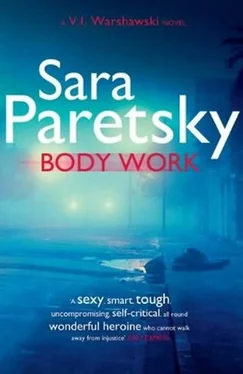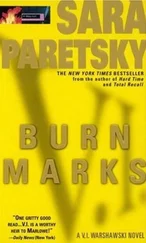Mona nodded vigorously: Chad wasn’t that kind of boy.
None of us spoke. I listened to the espresso machine hiss and to the snow sting the window. The bad weather, the awful economy, they had already pushed my spirits low without adding an unstable Iraq vet to the mix. I wanted to get up and walk away, but the Vishneskis were both looking at me as if I were all that tethered them to the planet.
“Okay,” I finally summoned the energy to speak. “Chad’s friends that he hung around with since getting home, how do I get in touch with them? Mr. Vishneski said there’s one called Marty, another one named Tim something.”
“Tim Radke,” Mona said. “Marty, I don’t know what his last name is. Probably they’re on the speed dial on Chad’s phone.”
Chad’s phone was still at her apartment. When the cops rushed him to the hospital Saturday morning, they’d left everything behind-phone, wallet-everything but his Army dog tags and his field jacket. He’d been wearing those.
“That’s why I went to stay at John’s,” Mona said. “It got me down too much, all his stuff, and then the police, they broke down the door when they came to get him. Why did they have to do that? And it’s me that has to pay to repair it. The city sure won’t! I should have been here instead of in Arizona. My ma, she’s got nurses around her, she only made me come down so she could run me around. I should have been here taking care of Chad. Shouldn’t have expected that John would know how to keep him out of trouble.”
“Mona!” Vishneski expostulated.
I interrupted before they could get into the kind of argument that probably led to their divorce all those years ago: she said, he didn’t do, back and forth. We agreed, all three of us, to go to her apartment, where I could collect the phone and study Chad’s habitat to see if he’d left any clues about his life that could prove his innocence.
We gathered up our things and walked out into the storm. The wind drove fine snow between my muffler and my sweater, and seemed to be scouring my face down to the bone. By the time we’d reached John’s Honda, a block from Lilith’s, even he was panting. Mona sat in front, staring at the snow. I dozed in the backseat while John crept the two miles to her apartment.
Mona lived in an old building that had probably been rather grand when it went up in the 1920s. Back then, each of the six floors held only two apartments, those big ten-room jobs with a cubicle behind the kitchen for the maid. In the nineties, some developer had gutted the place, converting grandeur into shoe boxes.
The elevator itself was a small box, barely big enough to hold the three of us. Husband and wife-ex-husband, ex-wife-moved together unconsciously as we rode to the fourth floor.
When we got off, Mona’s apartment was obvious at once: wooden slats were nailed across the hole left by the cops and a padlock had been screwed into the wall to keep the door shut. The sight was ugly and shocking. Mona’s hand shook as she burrowed in her giant bag for her keys. John silently accepted the scarf, the book, the billfold, the wad of tissues she pulled out as she hunted.
I had that prickly feeling that makes you think someone is watching you. When I turned to look, I didn’t see anyone, but down the hall there was a soft thud as a door was quickly shut. Some neighbor cared that we were here. I wondered if it was the woman who’d been screaming on television that she’d sue the condo board, that Mona Vishneski ought to be thrown out.
At last, Mona located her key ring, a plait of twisted metal, as laden with keys as a medieval jailer’s. It seemed to take her forever to go through them as she muttered, “No, that’s Ma’s storage locker… Oh, I think that’s Chad’s bike lock.” I resisted the desire to push her aside and work my picks into the lock.
When she finally had her door open and had stretched an arm around the corner for a light switch, I peered over her shoulder into the long rectangle that made up her living space. It had probably been an attractive shoe box a week ago, before the police tracked mud and salt across the newly sanded wooden floors and the area rugs that dotted them. One wall was lined with blond built-in shelves and cupboards.
Craning my head, still staying near the front door, I saw a stereo and a flat-screen TV. Mona didn’t have many books, but the shelves around the TV held pottery and treen, those small wooden objects whose original purpose always baffles me. The pieces were unexpected, and I looked at Mona again. What other unexpected depths might lie beneath that flat surface?
The kitchen stood at the far end, separated from the main room only by a kind of work island or maybe peninsula, since it was attached to the wall at one end.
Mona and John started into the room, but I put out an arm to hold them back.
“What all have you handled in here since you came home?”
Mona was startled. “I don’t know! How can I remember? The phone. I called an emergency service to put up the board and the padlock, like you saw just now, a place I used to use when I was at Mercurio. They remembered me and came right away, and while I was waiting, I’m sure I had a glass of water.
“I went into the bathroom. It was such a mess in there, Chad probably hadn’t even washed the tub while I was gone. I wondered if he’d taken his toothbrush.” She gave a hiccup which was half sob. “I stood looking at the sink and shaking my head over his messy ways like he wasn’t in a coma. They don’t know if he’ll recover, but you think these things automatically after twenty-five years: have you washed your hands, have you brushed your teeth.”
John put a hand on her shoulder and squeezed.
“I cleaned the sink. It… I don’t know, cleaning… When I’m upset, I clean.”
When I’m upset, I add to the landfill in my apartment. And then I’m more upset because the apartment is squalid. I wondered if there were drugs that could turn you into a neat freak.
“Then I went to my closet; I needed to get some sweaters. It wasn’t this cold in Phoenix, of course, and I knew I’d freeze to death at John’s, he doesn’t pay for heat, and-”
“Do you have to go through every detail of every sweet minute of your life?” John asked, his moment of empathy passing.
“Okay, okay,” I said. “You touched everything.”
“Is that bad?”
“If someone came in while Chad was asleep and planted the gun on him, it will be harder to find that someone’s traces, that’s all.”
“So you do believe he didn’t shoot that woman?” she said eagerly.
“Oh, Mona, why’d you have to go destroying evidence?” John said.
“How was I to know?” she defended herself hotly. “It’s not like you were doing-”
“Please.” I put my hands up traffic cop style. “Don’t argue, least not on my dime. It doesn’t help the investigation. And before you get too carried away blaming Mona for her glass of water, look at the mud and scratches the cops left behind. If someone else was here ahead of them, the police did a good job of wiping out all signs of them. Let me see the bedroom.”
Mona took me across the big room to her bedroom. Parting the blinds, I looked out at an enclosed courtyard, big enough for a bit of garden and some tables and chairs. The skeleton of a swing set rose out of the snow.
The building had been carved up in a way that created small alcoves in the bedroom. One held a desk, where Chad had left a partly eaten chicken dinner on top of a heap of bills and papers. While I inspected the bed, I heard Mona clucking over the bills under her breath.
Chad promised to pay the phone bill and the car insurance, but here are the envelopes not even opened! And Chad’s MasterCard… Who let him have a credit card when he didn’t have any income?
Читать дальше












